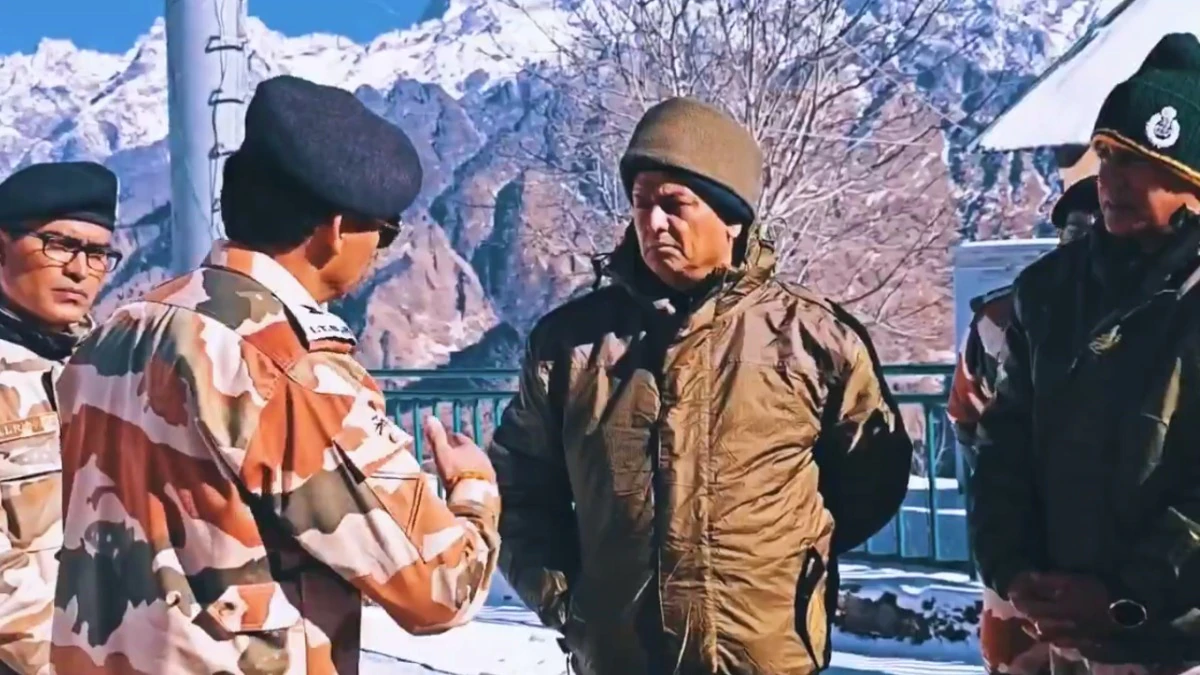Shah Hails Baluni for spending time with “Himveers”
Burocrazy Exclusive
Anil Baluni, BJP MP from Uttarakhand, interacting with Indo-Tibetan Border Police (ITBP) officials.
News in Brief
Union Home Minister Amit Shah recently praised Garhwal MP Anil Baluni for his dedication to spending quality time with the Indo-Tibetan Border Police (ITBP) jawans in a border village, an act that underscores both the importance of morale boosting among security forces and the political commitment to border security.
New Delhi: Union Home Minister Amit Shah recently praised Garhwal MP Anil Baluni for his dedication to spending quality time with the Indo-Tibetan Border Police (ITBP) jawans in a border village, an act that underscores both the importance of morale boosting among security forces and the political commitment to border security.
This event took place amidst the backdrop of India's vigilant stance on its northern borders, where the ITBP plays a crucial role in safeguarding the nation's territorial integrity.
Anil Baluni, representing the Garhwal constituency in Uttarakhand, has been recognized for his initiative to connect with the "Himveers" of the ITBP, a term of endearment for the soldiers who brave the harsh conditions of the Himalayan borders. His visit to spend a day with these soldiers, particularly in a border village, not only serves as a gesture of gratitude but also highlights the government's focus on supporting those who protect India's frontiers.
The commendation by Amit Shah was highlighted in various media outlets, including NDTV and ProKerala, where Shah praised the ITBP for their role in protecting border areas under challenging conditions. He emphasized the potential role of ITBP in also being a nodal agency for developmental work in these remote locales, showcasing a dual focus on security and development. By appreciating Baluni's efforts, Shah indirectly acknowledged the importance of political figures engaging directly with the armed forces, fostering a sense of solidarity and support.
Baluni's day with the ITBP personnel was not just about sharing meals or moments; it was also about understanding their challenges, boosting their morale, and reinforcing the message that their efforts are recognized at the highest levels of government. Such interactions are crucial, especially in areas where soldiers often work in isolation, facing not only the threats from across the border but also the natural adversities of high-altitude living.
This gesture by Baluni resonates with broader political narratives where leaders aim to demonstrate their commitment to national security and the welfare of defense personnel. It aligns with several initiatives by the government, like the 'Vibrant Villages Programme,' aimed at ensuring development and connectivity in border areas, thereby improving the living conditions of those stationed there.
Moreover, this event can be seen as part of Baluni's ongoing efforts to connect with his constituency, which includes significant military personnel. His previous actions, such as adopting a village to combat migration or organizing festivals to keep cultural ties strong, illustrate a pattern of active political engagement with both community and military aspects of his region.
In political terms, this act by Baluni and its recognition by Shah can be viewed as a strategic move to solidify voter base in a region known for its military contributions, where acknowledging and supporting the armed forces can have significant electoral implications. It also serves as an example of leadership by example, where politicians are seen on the ground, sharing hardships with the troops, which is often appreciated by both the military community and the general populace.
Overall, Anil Baluni's visit to the ITBP jawans and the subsequent acknowledgment by Amit Shah not only celebrate the bravery of the soldiers but also reflect a broader governmental strategy emphasizing security, morale, and development in border areas. This incident encapsulates a moment where political action, military morale, and national policy intersect, highlighting the integral role of personal engagement in governance and national security.
Advertise with US
Advertise with US









